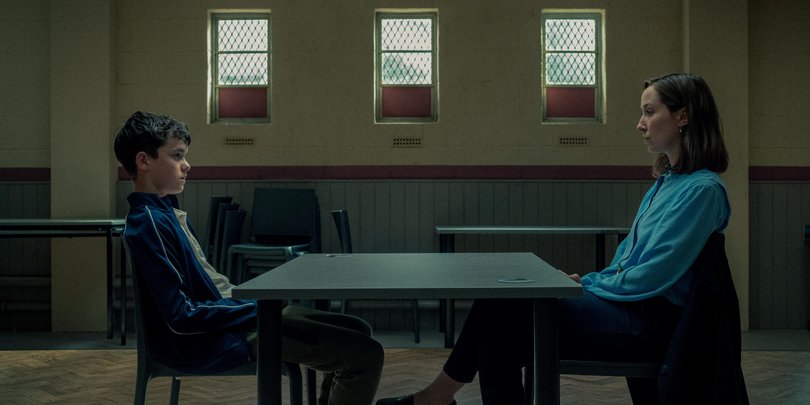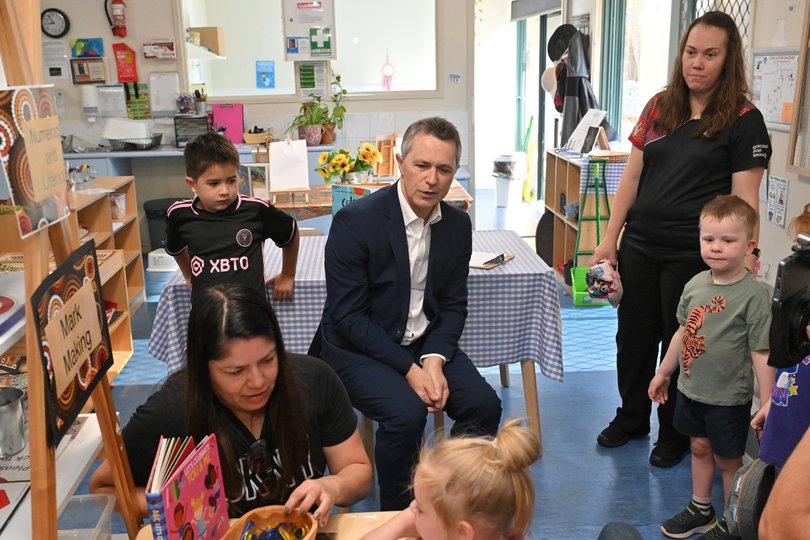Education Minister Jason Clare on Netflix series Adolescence, Andrew Tate and harsh lessons on schools
‘I think every dad would see themselves in that scene and hope and pray that that is never them.’

There’s a scene in the confronting Netflix drama Adolescence that Education Minister Jason Clare admits still haunts him.
The harrowing four-part show depicts how an insidious and misogynist online subculture conditions baby-faced teenager Jamie before the murder of his classmate Katie in a hate crime.
In the series’ final moments, his father Eddie dissolves into sobs over a teddy bear on Jamie’s bed, grieving under the weight of parental guilt about whether he missed warning signs that could have prevented his son’s actions.
Sign up to The Nightly's newsletters.
Get the first look at the digital newspaper, curated daily stories and breaking headlines delivered to your inbox.
By continuing you agree to our Terms and Privacy Policy.“I think every dad would see themselves in that scene and hope and pray that that is never them, that that never happens in their world,” said Mr Clare, who has two young sons of his own.
For the returning Education Minister, tackling the impact of dangerous algorithms and hyper-macho male influencers corroding the fabric of society and fuelling gender-based violence, is a challenge he is taking on both as a politician and a father.
It’s also one of the first issues on his agenda at the outset of a rare second consecutive term holding the education portfolio, and one he will put on the table at the first post-election meeting next month of state and territory education ministers.
“This is a problem that schools grapple with, but it’s bigger than schools. It’s a challenge for parents,” he said.
“It’s a responsibility of dads to make sure that our boys grow up the right way, but also that we don’t push our boys into the arms of people like Andrew Tate,” he added, referencing the controversial influencer currently facing rape and human trafficking charges in the UK.
An anti-bullying agenda
In a wide-ranging interview with the Nightly about his second term priorities, Mr Clare outlined a plan to deliver the reforms Labor promised over the past three years, from student debt relief to wage rises for childcare workers and an overhaul of university funding.
One of his first moves since the May 3 poll has been to instigate a review into bullying in schools to help education ministers form a national approach and best practice methods to fight problematic behaviour against both pupils and teachers.
Offering a glimpse of the scale of the problem, the month-long review racked up over 170 submissions from parents, young people and teachers in its first seven days.
Last week, Our Watch, a leading organisation in the prevention of violence against women, launched a blueprint to prevent gender-based violence through education systems.
Over a decade of research, the group found that 40 per cent of 16 to 17-year-olds had experienced sexual harassment in a place of study.
Almost one in four young women aged 18 to 24 had experienced image-based abuse, and girls were twice as likely as boys to feel pressured or blackmailed into sexting.
CEO Patty Kinnersly said the blueprint called for a “whole-of-school” approach to foster respectful relationships at a time when students and teachers were facing alarming rates of gendered violence, including AI-generated pornography and sexualised bullying.
“We’re also hearing that female teachers are starting to leave the profession, or they’re certainly reporting high levels of distress related to being harassed and undermined or challenged by young men with misogynistic behaviour,” she said.
Mr Clare’s anti-bullying review was one piece of the puzzle to understand what’s driving the crisis, she said, urging Federal and state governments to “stay the course” with long-term funding.
Teaching kindness to beat the social media scourge
Separately, a $77.6m program, signed off under the previous Labor Government, to promote healthy relationships between girls and boys, aimed to teach “kindness, empathy and respect” in an age-appropriate way, said Mr Clare.
He did not rule out mirroring a British initiative – backed by UK Prime Minister Keir Starmer – to show Adolescence in high schools but wanted to seek “expert advice” on the idea first.
Australia is already forging its own world-leading path to combat the scourge of toxic online content.

“The other obvious thing that we need to do, that we’re acting on, is getting young people out of the cesspit of social media altogether,” said the Minister, highlighting a global-first social media ban for under-16s, due to come into force at the end of this year.
Teachers had fully endorsed a move to stop the poisoning of children’s minds and protect them from algorithms where “you end up buried into a place that you feel like you can’t get out of,” he said.
“Hopefully it will help tackle the rise of gender-based violence, full stop,” he added.
Education the key to better lives, better economy
Mr Clare’s anti-bullying drive is just one aspect of an ambitious reform agenda after being offered the unique opportunity to serve in the same ministry for a second term – a feat last achieved by former Liberal MP Brendan Nelson, between 2001 and 2006.
The Minister, who has talked openly in the past about being the first in his working-class family in Sydney’s western suburbs to graduate high school, views education as the key to boosting social equality and the economy.
He promotes fair access to a good education from the early years through to university as the pathway to improving lives, but is frank about the challenges ahead.
“The general message I want to get across is that we’ve got a good education system in Australia, but it can be better,” he said.
“(Evidence) shows that if you’re a young person from a poor family, or from the outer suburbs or from the regions, or if you’re Indigenous, you’re less likely to go to university,” said Mr Clare.
“You’re less likely to finish school than other young people. You’re more likely to fall behind when you’re little in primary school … you’re less likely to even get access to childcare.”
Fixing those inequalities is crucial to meeting the target of the 2024 Universities Accord review to lift tertiary qualifications from the current 60 per cent of 15 to 65-year-olds to 80 per cent by 2050 to meet workforce needs, he said.
His motivation to push through the biggest overhaul of the education system in a decade is drawn from former Prime Ministers Paul Keating and Bob Hawke, who transformed the education sector at a time when just 40 per cent of the population finished high school, and only a fraction graduated university.
“I got to meet Bob, and he would talk about (education) all the time. And the fact is that increasing the number of people that finished high school from 40 to almost 80 per cent changed Australia,” said Mr Clare.
“That reform created a different workforce with different skills that created new businesses. It helped create the Australia that we live in.”
Milestones for a second term
The first milestone of the second term reform agenda falls this weekend, when a new round of student debt relief comes into effect.
Last month, newly elected Prime Minister Anthony Albanese confirmed that legislation to reduce student debt by a further 20 per cent would be the first order of business when the parliament reconvenes on July 22.
The proposal to forgive $16 billion in debt, which helped Labor win the election, will be backdated to June 1, when indexation is annually applied by the tax office.
Rolling out a promised 15 per cent pay rise to early educators and a billion-dollar fund to build childcare centres and enforcing new “Better and Fairer Schools” agreements with every state and territory, will follow.
An April report by the Grattan Institute, warned that successive governments had set the bar too low on literacy and numeracy targets in schools, with one in three students not meeting proficiency benchmarks in the 2024 NAPLAN tests.
It called for the long-term target to be raised to 90 per cent of students.

Mr Clare argued the recent schools agreements, signed in March to commit $16.5b in additional Commonwealth funding to public schools over the next 10 years, were tied to reforms to boost literacy and numeracy levels.
He said the funding recommended in a groundbreaking review by business leader David Gonski in 2011 would enable catch-up tutoring and individualised support.
“What we know is that students who fall behind when they’re little, almost never catch up,” he said.
But he said a “real challenge” of the funding deal lay in turning around an alarming dive in the number of students finishing high school.
“In public schools, over the last 10 years, it’s dropped from 83 per cent to 73 per cent. That’s what keeps me up at night,” said Mr Clare.
“If you finish school, you’re more likely to be able to then go onto TAFE or to university, and more likely to build that workforce that we’re talking about.”
Integrity reforms from early childcare to tertiary education
Among his second-term ambitions, Mr Clare wants to improve the integrity of the entire education system from ensuring children’s safety in childcare centres to eradicating migration fraud in the international student sector.
Whether the measures to crack down on immigration crooks and bad operators in childcare will take the form of a specific new bill is still under consideration.
But legislation will be reintroduced to establish a code of conduct to combat sexual violence at universities as well as a fresh bill to build a needs-based funding system for universities.
“Like the Gonski model for schools,” it would aim to offer the right amount of support for students.
The Government will follow the recommendations of the Universities Accord to pay teaching, nursing, midwifery and social work students during practical training.
But there are no current plans to reintroduce a cap for overseas students that was rejected last year by the Coalition and the Greens.
Ministerial Direction 111, which slows down student visa processing when a tertiary institute nears its target, was working to bring down numbers, said the Minister.
The international education sector has hit turbulent times globally after a move by the US this week to suspend student visa processing to ramp up vetting of their social media.
It’s a situation the Australian government is closely monitoring.
“What the US does is a matter for the US,” said Mr Clare, but added that it was “certainly not something that we would ever do here in Australia.”
As the conversation circles back again to social media, he said he hoped young Australians would not be judged on the basis of their prior posts.
“We live in a world now where everybody leaves a digital footprint, and it’s not just about going overseas, it’s employers look at these things as well,” he said.
“It probably makes most of us who are Gen X’s think about what our digital footprint would look like if we ever had one when we were younger.
“But I also don’t want young Australians judged based on everything that they put on social media when they’re young.”

